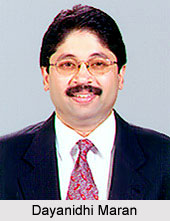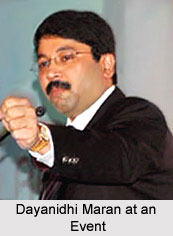 Dayanidhi Maran is a well-known face among Indian politicians. He became the Member of Parliament in India`s 15th Lok Sabha and was elected from Central Chennai Constituency. Moreover, he is Additional Deputy Leader of DMK. Maran was also the Minister for Textiles in the Union Cabinet, and was also the Cabinet Minister of Communication and Information Technology department of the UPA Government till May 2007. After the controversy of 2G spectrum scam, Dayanidhi Maran resigned from the position of Minister for Textiles.
Dayanidhi Maran is a well-known face among Indian politicians. He became the Member of Parliament in India`s 15th Lok Sabha and was elected from Central Chennai Constituency. Moreover, he is Additional Deputy Leader of DMK. Maran was also the Minister for Textiles in the Union Cabinet, and was also the Cabinet Minister of Communication and Information Technology department of the UPA Government till May 2007. After the controversy of 2G spectrum scam, Dayanidhi Maran resigned from the position of Minister for Textiles.
Early Life of Dayanidhi Maran
Dayanidhi Maran was born on 5th December 1966 in Kumbakonam, Thanjavur, in Tamil Nadu. He is the son of late Murasoli Maran, an important leader of the DMK and the grand nephew of (DMK) president M Karunanidhi. Maran completed his studies from Don Bosco, Egmore, in Chennai and later did his graduation in Economics from Loyola College in Chennai. He is the younger brother of Kalanidhi Maran, the founder and managing director of Sun network, group that owns and operates largest number of satellite television channel. Before appearing in the 2004 National Elections, Maran was associated with the Print Media. He is an Amateur Radio Operator. His HAM Radio Callsign is VU2DMK.
Political Career of Dayanidhi Maran
 In the Parliamentary election held in 2004, Dayanidhi Maran contested as a candidate of the Dravida Munnetra Kazhagam (DMK) from the Central Chennai Constituency. He won the elections by securing 61.7% of the 512,820 votes polled and won by a margin of over 1, 34, 000 votes and became the Cabinet Minister. As a Union Minister of Communication and Information Technology, Maran brought down the rates of mobile and landline calls. In May 2007, Dayanidhi Maran resigned from the post owing to certain controversies. In 2009, he became the Minister for Textiles. But on 7th July 2011, Dayanidhi Maran resigned after he was accused by the CBI in the 2G Scam.
In the Parliamentary election held in 2004, Dayanidhi Maran contested as a candidate of the Dravida Munnetra Kazhagam (DMK) from the Central Chennai Constituency. He won the elections by securing 61.7% of the 512,820 votes polled and won by a margin of over 1, 34, 000 votes and became the Cabinet Minister. As a Union Minister of Communication and Information Technology, Maran brought down the rates of mobile and landline calls. In May 2007, Dayanidhi Maran resigned from the post owing to certain controversies. In 2009, he became the Minister for Textiles. But on 7th July 2011, Dayanidhi Maran resigned after he was accused by the CBI in the 2G Scam.
Personal Life of Dayanidhi Maran
Dayanidhi Maran is an avid reader and takes keen interests in sports. He loves playing golf, cricket and tennis. Furthermore, he is an Amateur Radio Operator and VU2DMK is his HAM Radio Callsign. He married Priya Dayanidhi Maran on 26 Aug 1994. The couple has one son and one daughter.




















